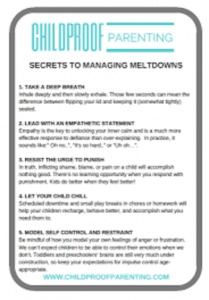Do you wish your preschooler or toddler would JUST STOP WHINING? That your child would go to bed maybe the second time she’s asked rather than the 100th? That your children would stop fighting, yelling, tormenting each other, making outlandish demands, or otherwise acting outrageously? If only!
Parents tend to complain about our kids’ “out of control” behavior — that our kids don’t listen, don’t behave, or don’t respect us or their siblings. But expecting young children to master impulse control is like expecting them to multiply fractions: not realistic. Until about age 7, they just don’t have that rational brain that allows for planning, foresight, and considering others. You can’t change that fact. But what you can change is how you react to your children’s outbursts — and in doing so prompt calmer behavior from them. When you respond with empathy rather than exasperation or outrage your children are far less likely to resist or retaliate.
Our children are going to replicate our behavior and emotional state because that’s how our brains are wired. The idea isn’t to change your children but to change how you show up and communicate with them.
Why their fury sparks our fury
You know how yawning is contagious? Or how watching someone sip an icy cold lemonade suddenly makes you thirsty? That’s because of nerve cells in our brain called “mirror neurons”. We humans are social animals and connect through shared emotions and experiences. So when our children are having a big tantrum, that cues our bodies to react the same way. But mirror neurons can work in your family’s favor, too. When you stay calm, your child’s body will start replicating your emotional state.
Some children are innately more impulsive than others their age and more prone to outbursts. But no matter what your child’s temperament, or your own, you can help them develop self-control by learning to stay calm yourself.
How to respond to tantrums and meltdowns.
-
Take a deep breath.
Before you say a word, let alone shout, “Do you SERIOUSLY think it’s OK to whack your brother on the head with a Pokemon binder?” inhale deeply and then slowly exhale. Those few seconds can mean the difference between flipping your lid and keeping it (somewhat tightly) sealed.
If you’re feeling too enraged to even take a deep breath, that’s your cue to exit the room until you’re able to chill out.
-
Start with empathetic statements.
Empathy is the key to unlocking your inner calm. It’s important to let your child know you understand and accept their feelings before you say or do anything else.
So instead of, “How many times do I have to tell you it’s bedtime? Get in bed NOW!” try, “Yeah, I know, it’s so hard to go to bed when you’re having fun playing!”
A child isn’t likely to dive under the covers just because you’ve shown concern for her feelings. But, empathy opens the door to a child hearing what’s going to come next rather than becoming defensive. When children don’t feel heard, it’s like: Oh, you didn’t hear me? Then I’m just going to say it louder!
Empathy is also a much more effective response to defiance than over-explaining. Our tendency as parents is to go on and on, to repeat ourselves and try to rationalize with our child. This is irritating to children and causes them to tune us out.
-
Resist the urge to punish.
When your children blatantly defy you or behave unacceptably (see: whacking with Pokemon lunchbox), you may feel like you want to “teach them a lesson” or “show them who’s boss.” You may think doing anything less would send the message: I’m a pushover! Go ahead, walk all over me!
In truth, inflicting shame, blame, or pain on a child will accomplish nothing good. There’s no learning opportunity when you respond with punishment. It just makes children fear their parents. Either they think I hate you or I am going to find another way to get away with this.
This doesn’t mean your child has a license to hit, steal from her siblings, or party in her room until midnight. Consequences are fine — your child doesn’t need to like what’s coming — as long as they’re reasonable and delivered respectfully.
In the long run, “We’re going to put these race cars away for the night, and you guys can play with them tomorrow,” will do more for your children than, “Go to your room NOW — both of you! And forget playing with these cars for a week!”
Kids do better when they feel better.
-
Let your child chill.
These days, our children’s lives are so filled with gadgets, activities, and demands that kids often use up their limited reserves of self-control. If we’re constantly asking children to perform tasks or follow our requests they’ll become less and less successful.
Scheduled downtime and small play breaks in chores or homework will help your children recharge, behave better, and accomplish what you need them to.
-
Model self-control and restraint.
If every time your phone beeps you pick it up, you’re not modeling impulse control for your children. Likewise, if you shout, “Jerk! Nobody knows how to drive around here!” when a car cuts you off, you’re not demonstrating how to remain calm. We can’t expect children to be able to control their emotions when we don’t.
How you respond to frustration and disappointment will strongly influence how your child responds to these strong emotions. Try, “Oh man, I just dropped the dinner salad on the floor! How frustrating! I’m going to take a deep breath and then I will need to clean up this mess and start over.”
As your children mature, they’ll naturally develop more self-control, but you can make a big difference along the way. Just keep your expectations for impulse control age-appropriate. Toddlers and preschoolers’ brains are still very much under construction.

Need a cheat sheet to remember all this? Click here.
[irp posts=”2696″ name=”Sassy Bossy Back Talk – Understanding Why It Happens and What to Do (by Melissa Benaroya)”]
About the Author: Melissa Benaroya
 Melissa Benaroya, LICSW, is a Seattle-based parent coach, speaker, and author in the Seattle area (MelissaBenaroya.com). She created the Childproof Parenting online course and is the co-founder of GROW Parenting and Mommy Matters. Melissa provides parents with the tools and support they need to raise healthy children and find more joy in parenting. Melissa offers parent coaching and classes and frequently speaks at area schools and businesses. Check out Melissa’s blog for more great tips on common parenting issues and Facebook for the latest news in parent education!
Melissa Benaroya, LICSW, is a Seattle-based parent coach, speaker, and author in the Seattle area (MelissaBenaroya.com). She created the Childproof Parenting online course and is the co-founder of GROW Parenting and Mommy Matters. Melissa provides parents with the tools and support they need to raise healthy children and find more joy in parenting. Melissa offers parent coaching and classes and frequently speaks at area schools and businesses. Check out Melissa’s blog for more great tips on common parenting issues and Facebook for the latest news in parent education!


Thank you so much for your message, Sheila! I am thrilled that you are interested in sharing this information with the families you work with. That cheat sheet has moved and you can find it here in the original post:
https://www.childproofparenting.com/blog/2016/6/6/tantrums-meltdowns-and-fits-childproofing-your-parenting-to-create-greater-calm-ease
Please let me know if there is any other information or resources that would be helpful to you or the families you serve.
– Melissa
Hello, Would you please email me the “Cheat Sheet Childhood Parenting, Secrets to Managing Meltdowns”. I was looking around on your site and found that you have great information for me to share with the parents of the students I serve.
The Cheat Sheet would not open up when I clicked on it. I would greatly appreciate a copy.
Thanks,
Sheila
Thank you so much for your message, Sheila! I am thrilled that you are interested in sharing this information with the families you work with. That cheat sheet has moved and you can find it here in the original post:
https://www.childproofparenting.com/blog/2016/6/6/tantrums-meltdowns-and-fits-childproofing-your-parenting-to-create-greater-calm-ease
Please let me know if there is any other information or resources that would be helpful to you or the families you serve.
– Melissa
These are excellent suggestions, AND I am laughing out loud about “Oh man, I just dropped the dinner salad on the floor! How frustrating! I’m going to take a deep breath and then I will need to clean up this mess and start over.”
(I have no children with whom to deal, but I DO have a sixty-eight-year-old Narcissistic Borderline boy.)